Press Coverage Documentation
Historical newspaper coverage provides primary source documentation of the TLRC/CMRI from contemporary perspectives. Complete archive available:
Note: The Coeur d'Alene Press archives are not digitized. Microfilm and print copies are available at the Coeur d'Alene Public Library for researchers conducting manual searches.
Media Coverage Timeline
Journalistic coverage of the TLRC began in the early 1970s, with significant increases following the organization's acquisition of Mount Saint Michael in 1978. Coverage continued extensively through the late 1980s, providing contemporary documentation of organizational development, controversies, and the 1984 leadership transition.
According to newspaper database searches, the name "Francis Schuckardt" appears in over 550 newspaper articles, though many are syndicated reports. Approximately half represent unique journalistic coverage spanning from the early 1970s through the 2000s.
Early Critical Coverage (1974-1975)
April 12, 1974 - The Catholic Northwest Progress
The Diocese of Seattle's publication issued warnings about Schuckardt's organization, featuring criticism from Fr. Lawrence Brey, a former associate who had left the group. This represents some of the earliest institutional Catholic criticism of the organization.
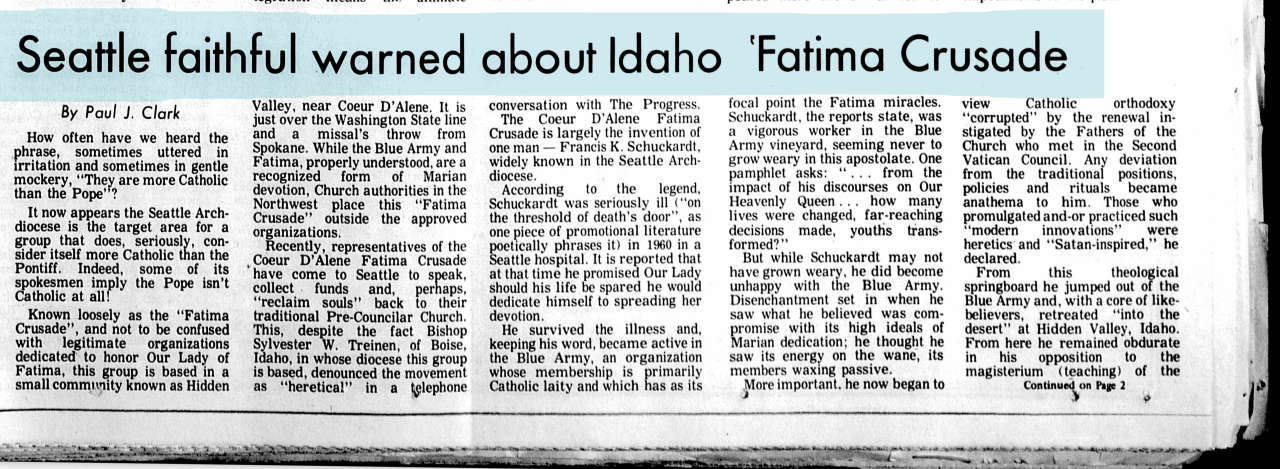
January 24, 1975 - Legal Proceedings Coverage
Coverage of the Radecki Brothers lawsuit against Schuckardt, representing early documentation of family separation disputes. Attorney Bliss Bignall represented the CMRI in this and subsequent legal proceedings.

Feature Investigations (1978-1979)
March 3-4, 1978 - Spokane Daily Chronicle
Reporters Hazel Barnes and Nancy Woolum published a two-part investigative series examining the organization and interviewing both current and former members. This represents early in-depth journalistic analysis of the group's practices and impact on families.

May 30-31, 1979 - The Spokesman-Review
Staff writer Cheryl Ernst produced a comprehensive two-part analysis examining allegations and organizational responses. The series included extensive interviews with critics, supporters, and former members.

Continue to page A6 | Part 2: "Tridentine: Cult or 'True Church'?" | Part 2 (page A6)
Community Relations Documentation
June 1979 - Local Tensions and Community Outreach
Coverage documented both community tensions, including protests by former member John Tamplin, and organizational attempts at community outreach, such as neighborhood potluck dinners.

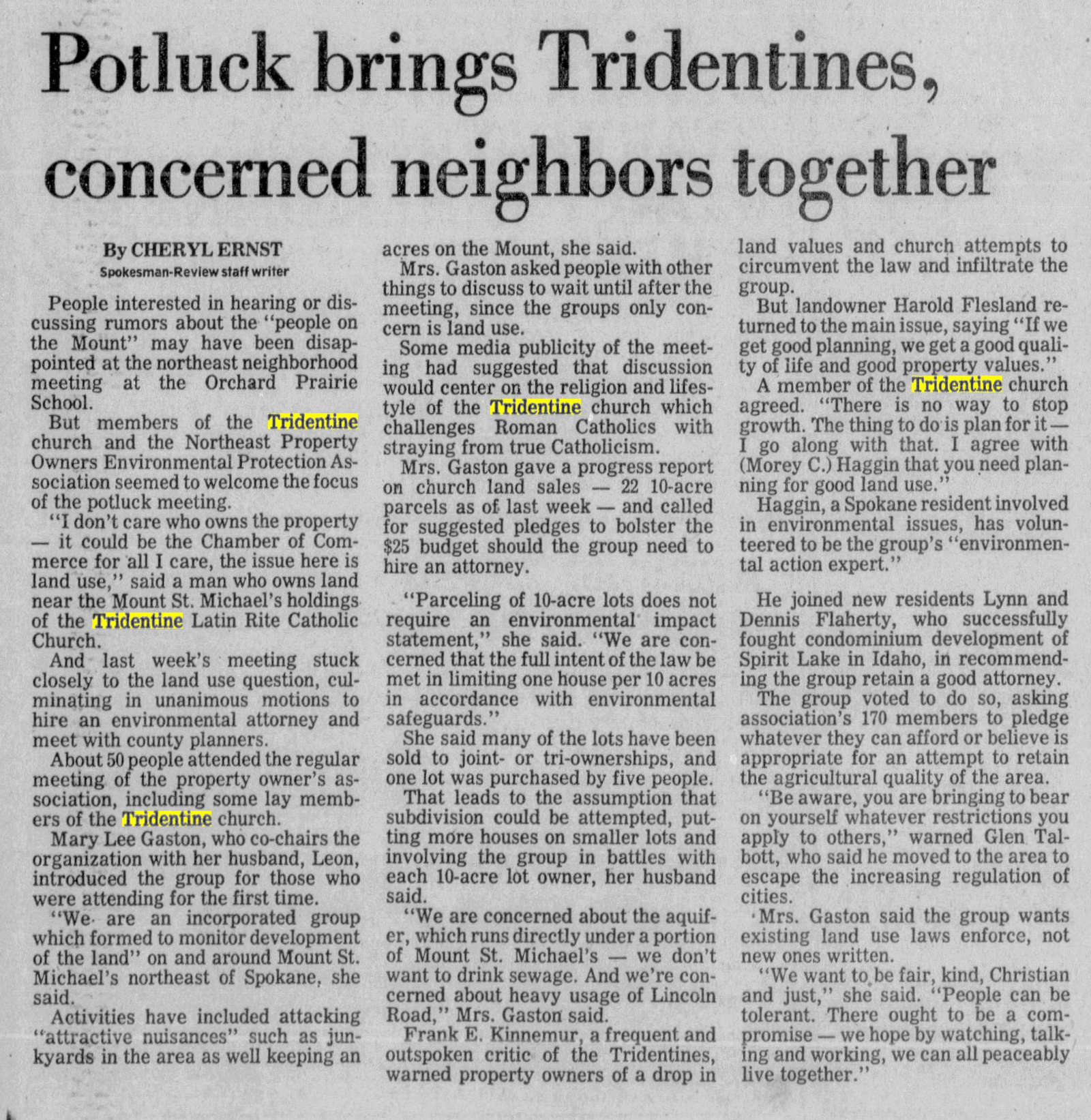
Systematic Journalistic Investigation (1980-1981)
Bob Cubbage Series - The Catholic Northwest Progress
Beginning November 27, 1980, reporter Bob Cubbage published a comprehensive seven-part investigative series examining the organization's history, practices, and controversies. This series, later compiled into book form, remains among the most detailed contemporary journalistic examinations of the TLRC.

Complete Cubbage Series:
1984 Organizational Crisis Coverage
June 1984 - The Coeur d'Alene Press
Local Idaho media provided detailed coverage of the June 1984 leadership crisis and armed confrontations. These reports document the immediate circumstances surrounding Schuckardt's departure and the organizational split.
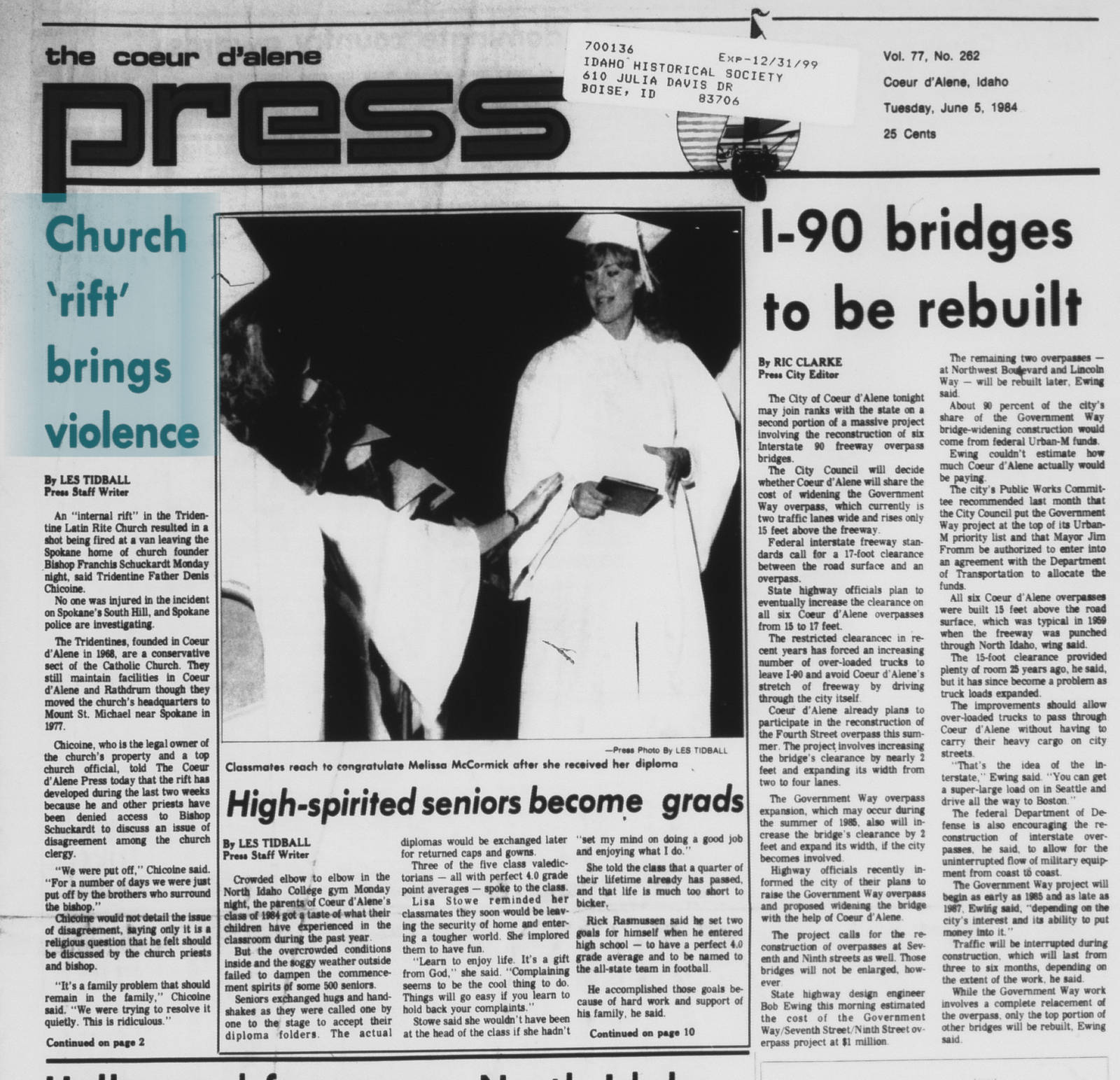
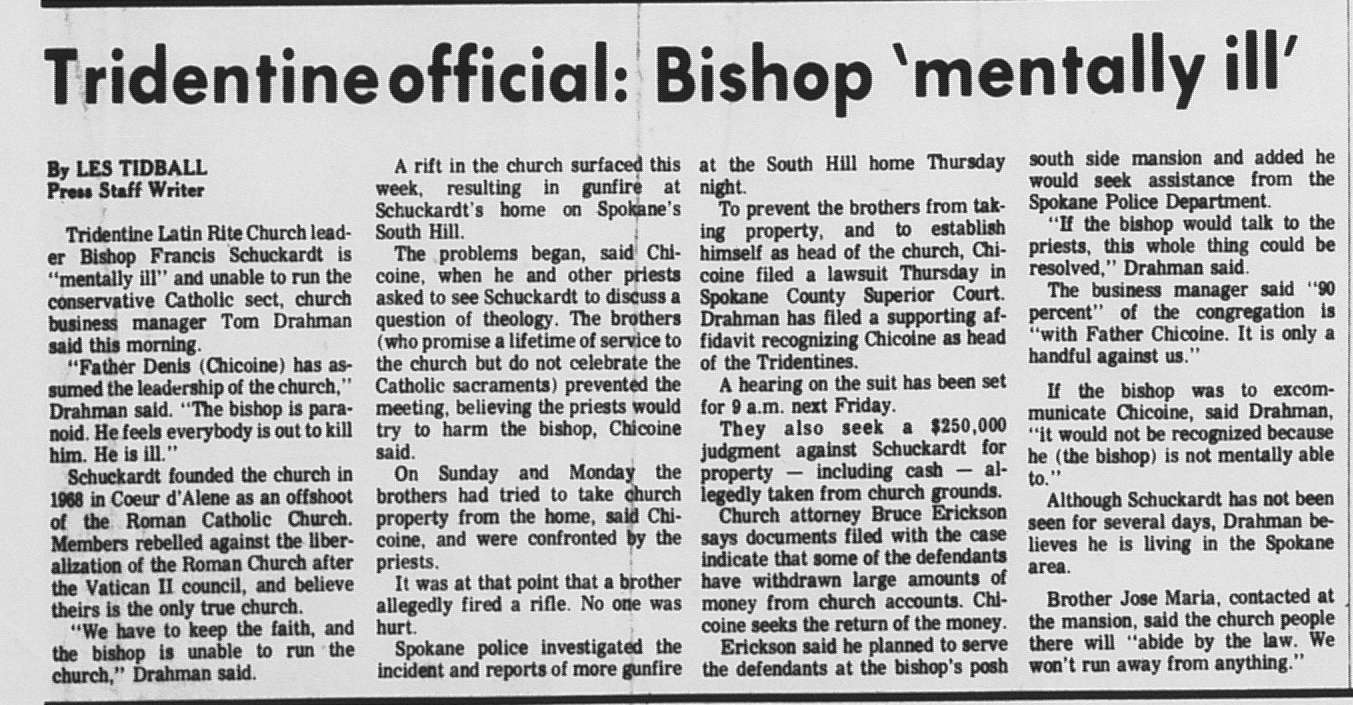
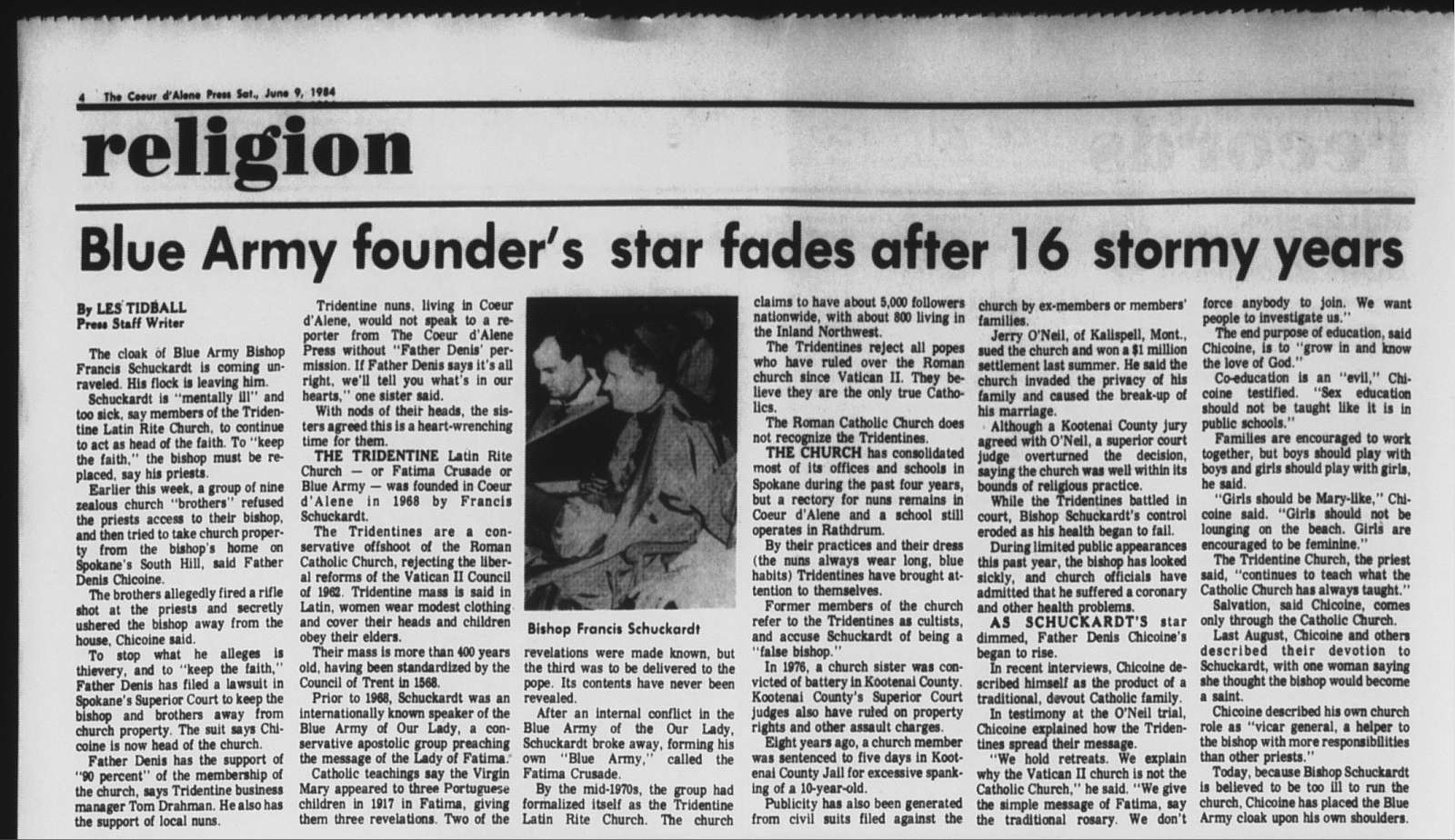
August 26, 1984 - Post-Crisis Interview
The Spokesman-Review published an interview with Schuckardt several months after his departure, providing his perspective on the organizational split and allegations against him.

Post-Split Analysis (1986-1987)
July 27, 1986 - Organizational Assessment
Reporter Jim Sparks examined the post-Schuckardt organization, including interviews with former members questioning whether fundamental changes had occurred after the 1984 leadership transition.

Additional pages: A10, A11, A12
January 11, 1987 - Episcopal Transitions
Coverage of conflicts between the CMRI and Bishop George Musey, who departed in September 1986 with approximately 100 followers. The article provides context about Musey's background, including his family history.

Later Period Coverage (1987-2007)
May 14, 1987 - California Raid Documentation
Coverage of law enforcement actions against Schuckardt's group in California, including seizure of medications and subsequent legal proceedings. This coverage documented the group's activities after leaving Spokane.
Detailed coverage of the 1987 California raid
November 19, 2002 - Seattle Times Investigation
Reporter Susan Kelleher's investigation of Schuckardt's group following violent crimes involving members. This article provided updated information about the organization's status and practices nearly two decades after the 1984 split.
Complete article: "Sect Behind the Shroud"
November 4, 2005 - Family Separation Documentation
Coverage of ongoing family separation issues and attempts by relatives to maintain contact with members.
Article: "Denver family tries to free mother from religious cult"
November 25, 2005 - TLRC Hiding Members Accused of Abuse
TLRC under Schuckardt was shielding or hiding members accused of sexual abuse of children.
June 21, 2007 - Religious Personnel Transitions
Documentation of 15 nuns leaving Mount Saint Michael to join the Diocese of Spokane, representing significant personnel changes within the post-Schuckardt organization.
Historical Significance of Press Coverage
The extensive newspaper documentation provides several important research benefits:
- Contemporary Perspective: Articles capture viewpoints from the time periods when events occurred, before later reinterpretations
- Multiple Stakeholder Views: Coverage includes perspectives from organizational leadership, current members, former members, family members, and community observers
- Documentation of Change: Reporting shows organizational evolution, leadership transitions, and changing public perceptions over time
- Legal and Factual Record: Court proceedings, property transactions, and official statements are documented in contemporary news reports
- Community Impact Assessment: Local coverage documents the organization's relationship with surrounding communities and institutions
Researchers should note that newspaper coverage reflects the limitations and perspectives of the era in which it was produced. The "anti-cult" movement context of the 1970s and 1980s influenced some reporting approaches and terminology used in coverage of the organization.